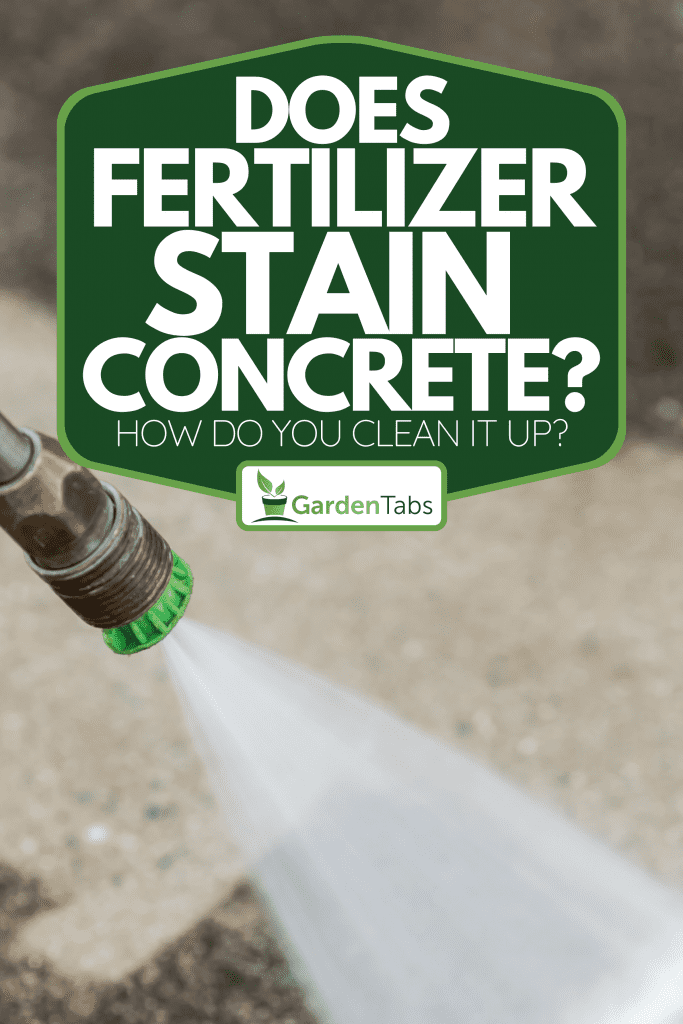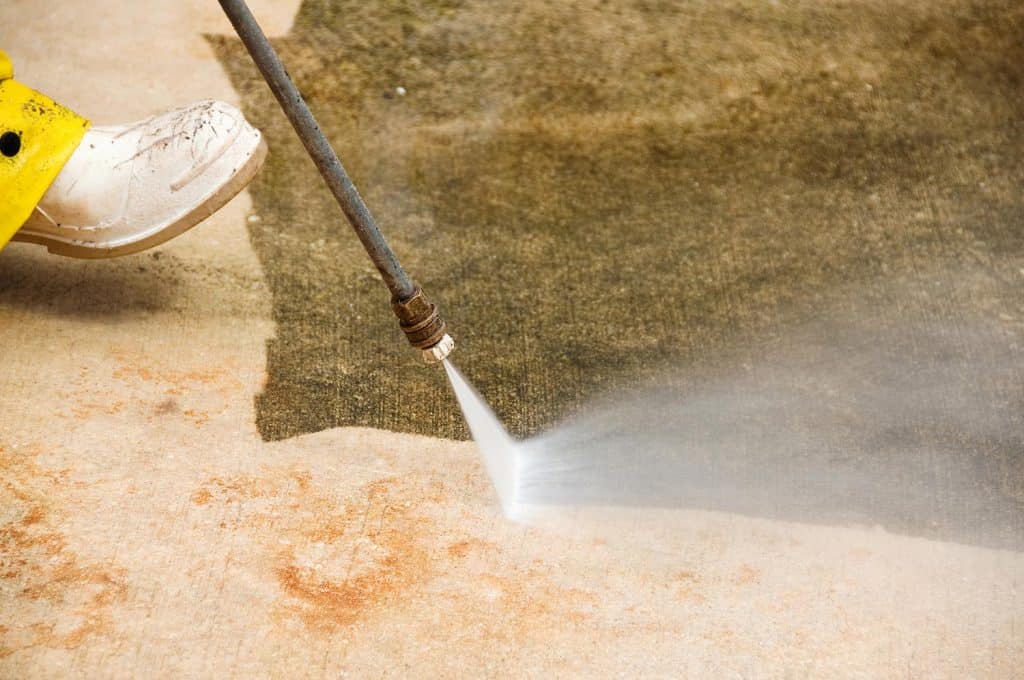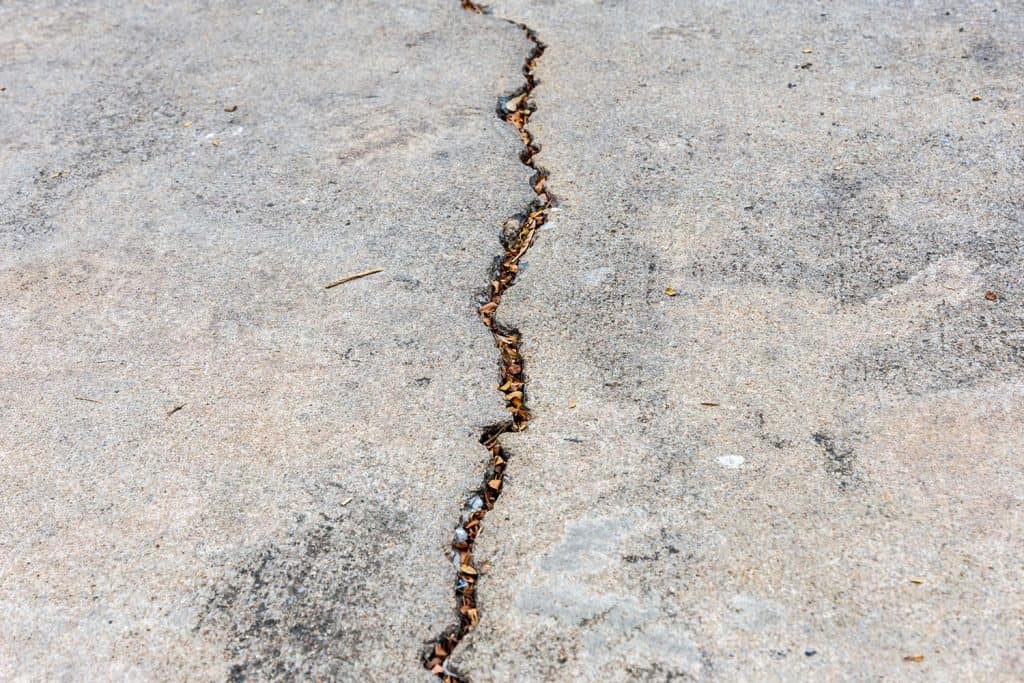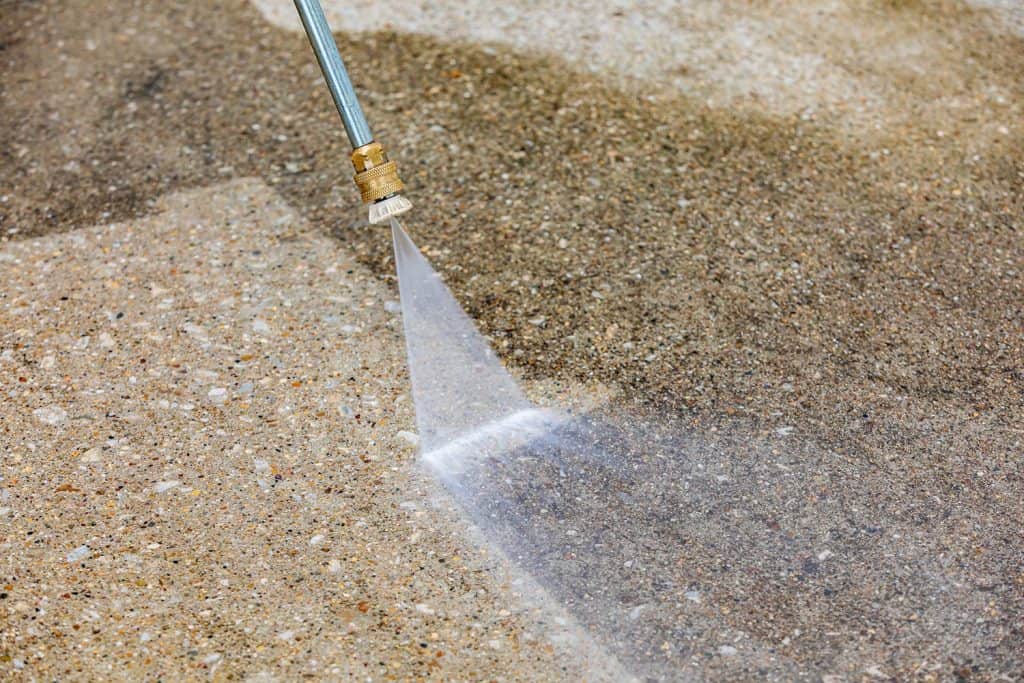Have you noticed some orange stains on your sidewalk or driveway, and you aren't sure how they got there? Ask yourself, "Have I recently fertilized my lawn or plants?" If the answer is yes, then that could be the cause. But does fertilizer stain concrete? We've done the research to answer this question.
Fertilizer can stain concrete due to one of the ingredients found in it. Those stains are rust but aren't permanent. They can be cleaned by using either a vinegar and water solution or a product designed to remove rust buildup from concrete.
What exactly causes fertilizer to stain concrete? And how can you clean up those stains? Does it affect your concrete in any way? We'll answer all those questions and more to help you remove and prevent those pesky fertilizer stains in this article. Continue reading to learn more.

What Causes Fertilizer Stains?
Fertilizer is necessary to help your plants and grass grow better and more abundantly. It does so by being made up of many ingredients that are essential for plant growth. Three ingredients that are the most abundant in fertilizer are nitrogen, potassium, and phosphorus. But there are micronutrients in fertilizer as well, including metals such as iron and zinc.
What's causing those fertilizer stains is iron. Iron is necessary for fertilizer because it helps plants make a chemical called chlorophyll. Chlorophyll gives plants their green color, and it plays one of the most essential roles in plants. It helps absorb sunlight so that plants can make their food and produce enough energy to stay alive.

But, the stains are essentially rust, which is why they are orange. Rust is caused by iron, and it occurs when iron comes into contact with moisture, either as a result of liquid fertilizer or water from rain or the hose. It doesn't take long for rust to form, which is why you may notice those stains only a day or two after fertilizing your lawn.
How To Clean Fertilizer Stains From Concrete
There are two methods you can use to remove fertilizer stains from concrete. The first method involves making a solution of water and vinegar mixed in equal parts. Apply the mixture to the stains by either spraying or pouring it onto the concrete.
The acidic properties of the vinegar will help to break down the stain. But, you will need to scrub it to remove it. After scrubbing it, use a hose to spray water across the sidewalk or driveway to rinse it off. Note that the vinegar may not remove all of the stains at once. You may have to repeat this process several times.
If you've used the vinegar method several times and the stain still hasn't been removed, or the stain has been there for a long time, then you may have to use a stronger product. There are products made especially for removing rust from surfaces, including some specifically made for concrete.
These products should be able to be purchased at any home improvement store. But they are very strong chemicals, so it's a good idea that you only use them outside and wear a mask when doing so to avoid inhaling any potential fumes.
How To Use Concrete Rust Remover
The first thing you will need to do is prepare the rust remover. Most concrete rust removers come in powdered form and have to be mixed with water before applying them. Mix the product according to the instructions on the packaging until it reaches a gel-like consistency.
Next, you'll want to spread the gel over the stain. Remember that rust remover is a strong chemical, so it's best to wear gloves while doing this. You can use a mortar spreader or trowel to do this. Let the gel sit on the stained area for about 15 minutes.
After the gel has had plenty of time to break down the stain, you can rinse it off using a hose. The stain should be removed, but depending on the size and depth of the stain, you may have to repeat the process.
This rust remover for concrete will not harm your grass or plants when you rinse it off. Click here to see it on Amazon.
Is Fertilizer Bad For Concrete?

Fertilizer is bad for concrete, but it's not necessarily iron that causes damage. Iron has little effect on concrete, other than causing those unsightly stains. Instead, it's one of the other ingredients that are found in fertilizer, specifically ammonium sulfate.
Ammonium sulfate contains some of the nitrogen that is found in fertilizer, but the ammonium sulfate itself is chemically classified as a salt. But when ammonium sulfate gets wet, it has acidic properties and can cause corrosion as a result.
Essentially, it can eat away at your sidewalk, causing it to lose some of its structural integrity over time. This can cause your sidewalk or driveway to erode.
Even if it hasn't rained in a while and the concrete surface feels dry, concrete is porous and holds water within it. When the concrete absorbs fertilizer and the water inside it evaporates, some of that water is soaked up by the salts found in fertilizer. This can cause your sidewalk to expand and even crack.
Will Fertilizer Stains Go Away?
Even though the iron itself doesn't cause serious problems, it can do away with some of the aesthetic appeal of your concrete. Unfortunately, those fertilizer stains don't tend to go away on their own because, as previously mentioned, fertilizer doesn't just remain on the surface of the concrete.
It seeps down through the pores, so you can't remove it just by scrubbing it off with soap and water. Instead, you will need to use a product that penetrates deeper into the concrete and can remove the rust.
How To Prevent Fertilizer From Staining Concrete
If you're using liquid fertilizer, you can prevent it from staining by standing on the edge of the concrete and spraying it toward the grass. You don't want to stand on the grass and spray it toward the concrete, as there is no way to prevent it from seeping into it. Liquid fertilizer is a lot harder to remove immediately once it gets on the concrete.
If you're using solid fertilizer granules or powder, you don't have to be as careful with how you apply them. But if you do get any fertilizer on the sidewalk, you'll want to sweep it off after you've finished fertilizing it and before any water or moisture can touch them. That way, the granules or powder won't leave stains behind.
Does Moss Killer Stain The Driveway?
Moss killers contain some of the same ingredients as fertilizers but in different forms and amounts. Mosses thrive in moist areas, so moss killers work by drying out and dehydrating the moss itself.
They are effective at doing this because moss killers are high in sulfates. Sulfates are salts that pull the water out of moss when applied to it and soak it up. One of the main ingredients in moss killer is iron sulfate because it is fast-acting and can dry up the moss within a day or two.
With that being said, moss killers can stain concrete for the same reason that fertilizers can. It's due to the high amounts of iron in them that turns to rust when exposed to moisture.
And just like fertilizer, moss killer can be purchased in both liquid and granular form. You should take the same precautions when applying it around concrete to prevent stains from happening.
What Is The Best Way To Clean A Concrete Driveway?

In addition to rust stains from fertilizer, many other elements can stain a concrete driveway. After cleaning the rust off with a rust removal product, you may wish to clean the rest of the driveway as well. The best way to do this is with a pressure washer if your concrete is heavily stained.
But, you can also use a commercial driveway cleaner product or use a household product such as liquid dish detergent. You will first need to remove any debris from the driveway by sweeping it off or using a high-powered spray setting on your hose nozzle.
Then, wet the driveway thoroughly and apply the product. Use a push broom to spread the product and scrub the driveway. Rinse the product off, and repeat the whole process if necessary.
Click here to see this oil and grease remover for concrete on Amazon.
In Closing
Fertilizer can leave stains on concrete due to the iron found in them coming into contact with moisture. They can usually be removed with a rust remover product, and you can keep them from coming back by keeping fertilizer away from concrete when you apply it. Thanks for reading!
Read more related posts here:
15 Best All-Purpose Plant Fertilizers [Liquid, Powder, and Granular]


